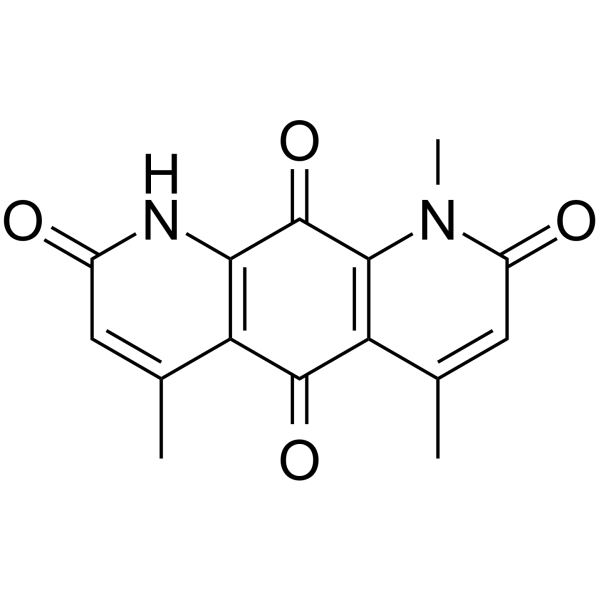上海金畔生物科技有限公司为生命科学和医药研发人员提供生物活性分子抑制剂、激动剂、特异性抑制剂、化合物库、重组蛋白,专注于信号通路和疾病研究领域。
Deoxynyboquinone
Deoxynyboquinone 是 NQO1 的底物,是有效的抗癌剂。Deoxynyboquinone 诱导癌症细胞凋亡 (apoptosis)。Deoxynyboquinone 通过氧化应激和活性氧 (ROS) 的形成杀死癌细胞。

Deoxynyboquinone Chemical Structure
CAS No. : 96748-86-6
| 规格 | 是否有货 | ||
|---|---|---|---|
| 100 mg | 询价 | ||
| 250 mg | 询价 | ||
| 500 mg | 询价 |
* Please select Quantity before adding items.
| 生物活性 |
Deoxynyboquinone, an excellent NQO1 substrate, is a potent antineoplastic agent. Deoxynyboquinone induces apoptosis in cancer cell lines. Deoxynyboquinone kills cancer cells through oxidative stress and reactive oxygen species (ROS) formation[1][2][3]. |
IC50 & Target |
Apoptosis[2][3]; ROS[4] |
|---|---|
| 体外研究 (In Vitro) |
Deoxynyboquinone (DNQ; 72h) potently induces the death of cancer cells (SK-MEL-5, MCF-7, HL-60, HL-60/ADR) in culture, with IC50 values between 16 and 210 nM[2]. Shanghai Jinpan Biotech Co Ltd has not independently confirmed the accuracy of these methods. They are for reference only. |
| 体内研究 (In Vivo) |
Deoxynyboquinone (2.5, 5, and 10 mg/kg; every other day for 5 injections; i.v. for day 2-18) shows antitumor efficacy confirmed by overall survival (at 5 mg/kg), at a 6-fold lower dose than β-lapachone (30 mg/kg)[4]. Shanghai Jinpan Biotech Co Ltd has not independently confirmed the accuracy of these methods. They are for reference only. |
| 分子量 |
284.27 |
| Formula |
C15H12N2O4 |
| CAS 号 |
96748-86-6 |
| 运输条件 |
Room temperature in continental US; may vary elsewhere. |
| 储存方式 |
Please store the product under the recommended conditions in the Certificate of Analysis. |
| 参考文献 |
|
所有产品仅用作科学研究或药证申报,我们不为任何个人用途提供产品和服务
